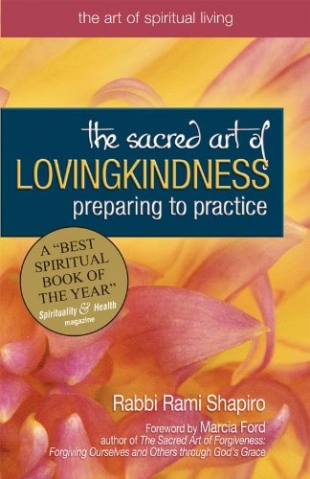Visualize Lovingkindness
"Practice these two visualization exercises daily. Wake up each morning and stand in front of a mirror, seeing your body as the incarnate Name of God. As you go about your day, see everyone and everything as the Name as well. Listen for your angel announcing your true nature, and listen for the angels of others doing the same. In time you will break up the hard-packed soil of the narrow mind and plant in it the seeds of lovingkindness that will soon grow and awaken in you the spacious mind that is your holy and most true self."
Serve Others with Kindness
"A rabbi I know devotes one day a week to simply being of service. She gets up in the morning and dedicates the day to God. She then leaves her home for the city close by and wanders about looking for ways to be of service to others. 'I have no plan for the day, other than to be present to what needs doing and to do those things I can without pride or prejudice. Sometimes I will find myself helping someone move into or out of an apartment, or sitting with the homeless, or walking tourists to their destination. The idea is to be free of any idea other than to serve, to befriend, to be kind."
Be Kind in Speech
"Avoiding hurtful speech has as much to do with how you say something as it does with what you wish to say: Keep it simple; stick to what you know to be true; and move on.
"Two thousand years ago the Rabbis asked this question: It is customary to compliment a bride on how beautiful she looks at her wedding, but what if this particular bride doesn't look beautiful at all? Is it permissible to lie? Is it better to avoid saying anything than to say something that isn't true?
"The Rabbis debated this as a means of exploring some of the subtleties of hurtful speech. They concluded that lying isn't acceptable, but neither is hurting a person with the truth. And avoiding talking to the person sends a negative message all by itself. So what is a person who seeks to practice lovingkindness through speech to do?
"Find a way of complimenting the bride without violating the truth of her feelings. For example, the Rabbis said, Say to her, 'You never looked more radiant' or 'You never looked lovelier' or 'You are positively glowing tonight.' You get the idea. Find a way of being for others — not down on them — whenever possible."
Preserve Kindness
"I rarely tell stories of kindness. I tend to remember slights — those I have made and those I have received. The more I tell such stories, the more I become the stories I tell. I had to work on shifting my storytelling to include at least some tales of kindness. And while I do that much more than I used to, a careful examination of my tales still shows that I tell such stories far more often about other people than about myself. I am not saying that I don't do acts of kindness; I am saying that I tend not to preserve these acts in the stories I tell. And since I am the stories I tell, I fail to reinforce kindness by failing to tell those stories.
"How do we preserve kindness? We preserve kindness the way we preserve any other value we cherish — we tell stories about it. Preserving kindness means telling stories of lovingkindness from your past, but not only your personal past. Working this attribute means exploring your family history to find stories of lovingkindness. Talk with relatives and explore your collective memories to sift out these tales. They may be small incidents of kindness that were largely unnoticed at the time, but which, in hindsight, are the stuff of kindness tales. When you find these stories, share them. The more you tell them, the more kindness will take root.
"One of the best ways to practice preserving kindness is to create a ethical will. Writing an ethical will is a centuries-old Jewish practice that is making a comeback among Jews and others. Originally an oral tradition, with parents passing on their values, blessings, life lessons, and forgiveness to their children, ethical wills have been committed to writing for the past one thousand years."
